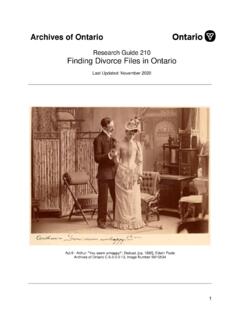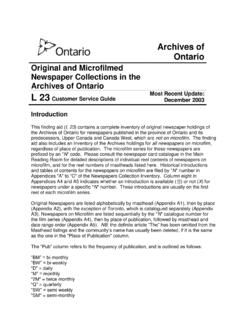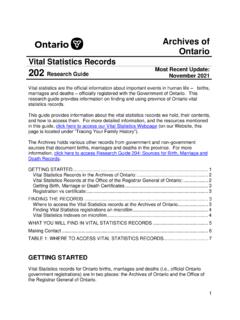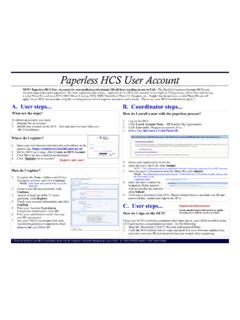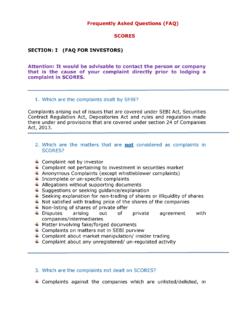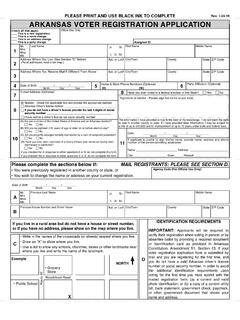Transcription of Archives of Ontario
1 1 Archives of Ontario How to Find a Will in Court Records 206 Research Guide Most Recent Update: March 2018 This research guide describes how to find a will that was filed in an Ontario court. In Ontario , the courts usually probate a will after the death of the individual. GETTING STARTED To find a will filed in Ontario , you will need to find the estate file. An estate file is the name of the file that has the documents that a Court in Ontario uses to disperse a deceased person's possessions, whether the person died with a will (testate) or without a will (intestate). Probate is the process of legally establishing the validity of a will before a judicial authority. Estate files for wills filed in Ontario are kept in one of two places: the Archives of Ontario (most files 1975 and before), or an Ontario courthouse (files 1976 and after).
2 This research guide describes how to find and use records at the Archives of Ontario and at local courthouses. Unless noted otherwise, all lists and research tools mentioned in this guide found in this Guide can be found: in the Archives reading room: in a binder titled User's Guide to Surrogate Courts online : click here to access the Court Records section of the Microfilm Interloan Catalogue; you will find in the Catalogue in the How to Access Your Records section of our website. At the end of this guide there is a list of legal words and terms that you may come across when you are searching for a will. You may also want to consult the pathfinder to Estate Files available in the Archives Reading Room or click here to access it on our website. This document explains how to 2 find wills (within estate files) that were filed with the courts between the years 1793 and 1970.
3 Note: Letters probates and letters of administration are usually not included in the estate files. Instead, they are found in the Surrogate Courts registers , along with a copy of the will. The Archives holds the registers for most, but not all, the years it holds estate files for. Please contact a reference archivist if you are looking for the letters probate or letters of administration Will Probations in Ontario A Short History Since 1777, three different courts have handled successions: From 1777 to 1792, Courts of Prerogative in each District handled succession where the person died without a will. Until 1791, wills were deposited with a notary public before the death. They were not probated in court after the death. From 1793 to 1858, the province-wide Court of Probate (Series RG 22-155) handled estates with property in two or more Districts valued over 5.
4 From 1793 to 1858, Surrogate Courts in each District (later, each County) handled estates with property in ONLY ONE district or county. After 1858, Surrogate Courts became responsible for all estate actions. (The Court of Probate was abolished in 1858.) All Wills Are Not in Court Records In doing your research, remember that not all wills are in court records. If the deceased person's estate consisted ONLY of real estate ( , farmers), the original will may have been deposited in the local Land Registry Office to transfer the land to the heirs. Some Land Registry Offices hold over 60 per cent of all surviving wills. Because they were never probated, these wills are not indexed or registered in the court records. Consult Research Guide 231, Finding land registration records for more information on how to find these wills.
5 THE RECORDS To find a will filed in Ontario , you must first look at an index to obtain a file number. To do so, you will need the deceased person s last name, death date (actual or approximate) and the county or district where the person had his/her main place of residence. As you do your research: Look for all possible variations of the deceased person s name ( , Smith , Smyth , Smythe ). Take into account phonetic pronunciations and possible clerical or typographical errors. If you do not find a mention of the estate file for the first few years after the death, you may want to search further a will may have been probated several decades after the death. 3 Try to get the location (county or district) where the person died. If you do not find an estate file in a certain county, check the county/district where the rest of the family lived or where the deceased person lived for most of his/her life.
6 Keep in mind the district s or county s date of creation since earlier estate files would have stayed at the court where they were probated. Courthouses use different columns in their indexes to record estate file numbers. Check the User s Guide to Surrogate Courts and Surrogate Clerk Microfilm Reels or the Microfilm Interloan Catalogue for instructions on how to use the indexes for the relevant county/district. Some courthouses renumber their estate files on January 1st, either annually or every few years. Record both the file number and the year (if given) corresponding to the deceased person s name. Finding Estate Files 1977 and after Estate files probated in 1977 or after are at the local courthouse. Table 2 at the end of this guide has the courthouse contact information. The Archives of Ontario holds the indexes for the two districts below.
7 Parry Sound District (to 1986) Rainy River (to 1977) For these two districts, use the User's Guide to Surrogate Courts and Surrogate Clerk Microfilm Reels or click here to access the Microfilm Interloan Catalogue to find the microfilm numbers (look up the table for the appropriate county/district). Once you have viewed the film and found the file number and year, contact the local courthouse (see Table 2 at the end of this guide): Finding Estate Files 1976 and before Estate files dated 1976 and before are in the Archives collection (records for some of the smaller courthouses are transferred to the Archives every few years only). The following section describes how to find these estate files. See Table 1 below for information on how to find the estate files. Some indexes for records dated 1976 and before (that the Archives of Ontario has) are still at the local courthouse.
8 Where this is the case, the information is included in both the User's Guide to Surrogate Courts and Surrogate Clerk Microfilm Reels and the Microfilm Interloan Catalogue. First, contact the courthouse (see Table 2 at the end of this guide) for the file number and year and then contact the Archives . Courthouses used different columns in their indexes to record estate file numbers. Check the User s Guide to Surrogate Courts and Surrogate Clerk Microfilm Reels or the Microfilm Interloan Catalogue for instructions on how to use the indexes for the relevant county/district. Some courthouses renumber their estate files on January 1st, either annually or every few years. Record both the file number and the year (if given) corresponding to the deceased person s name. Contact the courthouse (see Table 2) to retrieve the records you need.
9 4 If there is no Index listed in the User's Guide to Surrogate Courts and Surrogate Clerk Microfilm Reels or the Microfilm Interloan Catalogue for a particular county, use the microfilm reel of the Register Book for the appropriate years. The estate file numbers will be listed in the index either at the beginning or end of the volume, or in the margin of the page indicated. Not all registers are available through interrloan. If you do not find a register for a given county/district and year in the Microfilm Interloan Catalogue, check the User s Guide or consult one of our a reference staff. If you do not know the county where the will was probated: Check the Applications for Probate - Application Books and Index Books (Series RG 22-514). They list every estate file from 1859 to 1982 and the courthouse that handled it.
10 The Archives has these records on microfilm. See either the User's Guide to Surrogate Courts and Surrogate Clerk Microfilm Reels or click here to consult the Microfilm Interloan Catalogue for instructions on finding and using the microfilm reels you need. Once you know the county and the year, follow the instructions below on how to find the estate file. (Please note that the application number in these records does not match the estate file number used by the courthouse). 5 TABLE #1: Instructions for finding estate files 1976 and before Estate Probate Date Record Location How to Get the Records Before 1793 The Archives of Ontario has records of the Court of Prerogatives for the Districts of Hesse (series RG 22-6) and Lunenburg (series RG 22-7). These records are described in the online Archives Descriptive Database, in the Start Your Research section of our website.
